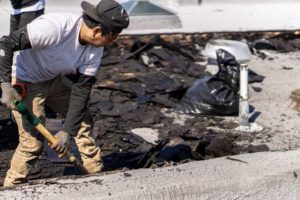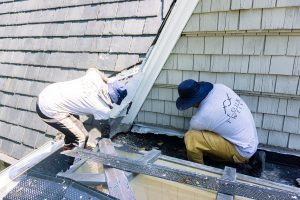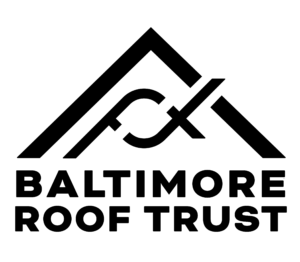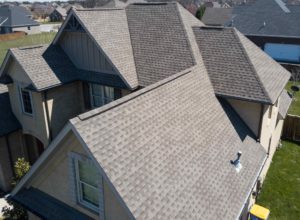A full roof replacement is rarely a cheap investment. While it can be necessary to protect your home, it’s likely that you’ll want to explore options to protect your new roof from future damage. Fortunately, many roofing projects are covered by some degree of warranty. However, as compared to say your car’s warranty, roofing warranties can be complicated, and sometimes confusing as to who is actually responsible for which part of your roofing project. So, if you’re exploring roofing companies in Anne Arundel county, let’s take a look at the ins and outs of roofing warranties so you can be prepared for your roofing project.

The Three Types of Roofing Warranties
When you commission a roofing project, there are typically three different ways your roof can be ensured. First, there are manufacturer warranties. These come from the manufacturers of the roofing materials that go into your project, such as the maker of the shingles. The second type of warranty are labor or workmanship warranties. These come directly from your roofing contractor and generally cover the labor that goes into the project. Lastly, there are no-dollar-limit or enhanced warranties, where the manufacturer of a roofing project also guarantees the labor along with the materials. Each of these warranties has its own limits and requirements. Let’s take a look at each option in depth.
Material Warranties

Material warranties protect the roofing materials used in your projects, such as your roofing shingles, metal beams, slate shingles, flashing materials, or coatings for flat roofs, among others. Generally, material warranties are meant to protect your roof from defective products. If a shingle doesn’t stand up to the weather the way the manufacturer thinks it should, you may be able to get reimbursed for the defective material. Material warranties are typically given a set number of years, usually in terms of 10 years, 15 years, 25 years, or 50 years (called lifetime warranties). The downside of material warranties is that they cover only the materials, not any labor that will go into replacing the defective roofing materials.
Workmanship or Labor Warranties

Workmanship warranties, also called labor warranties, are warranties that protect the physical labor from your roofing contractors that go into the roofing project. If there are any flaws in how the roofing contractor completed the project, you’ll have the right to bring them back to fix any errors. Workmanship warranties have no set structure and fluctuate from contractor to contractor. Always be sure to discuss the warranty at length with roofing companies in Anne Arundel County.
No-Dollar-Limit or Enhanced Warranties

The final type of warranty is called a no-dollar-limit warranty, also known as an enhanced warranty. These warranties are when a manufacturer of your roofing materials also guarantees the labor to fix defective materials. NDL warranties come with more stringent requirements, where the manufacturer will inspect the roofing project before they guarantee the warranty. Enhanced warranties can be a more substantial investment, but it is generally highly beneficial to have the workmanship of your project guaranteed by the manufacturer.
How to Protect Your Roofing Warranty
As we said, your roof is an investment. While a warranty is a great way to protect your project, there is some work you should do to ensure you make the most of your warranty. Here are some steps you can take to ensure your warranty does what you need.
Register Your Warranty: When a manufacturer offers a material warranty, they typically require that you register the project with them directly. Some contractors may handle this for you as part of the project scope. But remember that if you haven’t properly registered your warranty, you may not be able to claim any benefits when a defection happens.
Carefully Read the Fine Print: While a warranty may sound good in theory, it’s crucial that you actually read the fine print. There may be certain actions that invalidate the warranty. For instance, many contractors will not allow you to work on your own roof at risk of invalidating the warranty, as they don’t want to risk damage resulting from you, and being held responsible. Always read the details of your warranty before singing.
Ask About Fees: While not incredibly common, some warranties may require a fee to be secured. Always ask upfront about pricing and terms.
Stay with Your Original Contractor: Again, there are a whole host of ways that a roofing warranty can be invalidated. If you choose to hire a different contractor for repairs or follow-ups, your material manufacturer may invalidate your warranty.
Clarify What Workmanship Covers: Because there are no cross-industry standards for what workmanship warranties cover, it’s crucial that you ask for the specifics on what workmanship covers. Is it only repairs? What about leaks? What about storm damage or other Act of God instances? When it comes to warranties, the more you know, the better.
Schedule Regular Maintenance: The easiest way to have something go bad for your roof is by not having it maintained. Roofs are complex systems, and if you don’t check up on them, little problems can compound into much larger (and more expensive) problems.
Work With An Honest, Qualified Contractor: When it comes to choosing the right roofing companies in Anne Arundel County, you want someone with an established track record. Few things are more detrimental to your roofing project and potential warranty than hiring a contracting company with poor quality of work, and dishonest practices.
At Four Twelve Roofing, we have nearly 300 5 star reviews on Google. That’s something we’re extremely proud of, as we work had to meet the needs of each individual client, and provide expert, honest roofing services. If you are ready to get started on your roof replacement project, contact the team at Four Twelve Roofing today.







